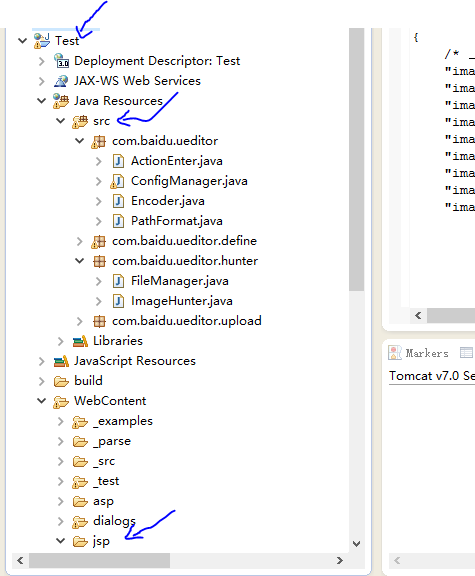开心一笑
一定要快乐学习,所以学习之前先看个笑话:
刚来北京,租了一个小房,一楼,上淘宝买衣服,选了付钱了联系卖家:“我已付款,请发货。”谁知那货直接说:“我看到你地址了,自己上楼来拿吧!我就在你楼上。”
拿你妹,老子付了邮费的。。。送下来。
视频教程
CSDN学院:
http://edu.csdn.net/lecturer/994
腾讯学院:
网易学院:
http://study.163.com/instructor/1035331499.htm
提出问题
Ueditor前后端源码的学习和简单的研究???
解决问题
前提:
- 假如你已经看了我的前一篇文章,这一点很重要的啊,当然不看也可以,因为你已经是一个高手,就像我一样,哈哈;
- 假如你已经安装tomcat服务器;
- 假如你已经把项目运行到Eclipse上;
- 假如你已经有java基础;
- 假如你对js有一定基础;
- 假如你已经下载ueditor1_4_3_3-src源码,记得是开发的哦;
那么开始吧!
这是我的项目目录
1.从访问路径http://localhost:8081/Test/_examples/simpleDemo.html,我们主要是要看看,富文本框被加载出来之前,会调用哪些代码,
不卖关子,很明显,会调用后端的controller.jsp代码,因为我们已经在ueditor.config配置了:
// 服务器统一请求接口路径
, serverUrl: URL + "jsp/controller.js
看看controller.jsp代码,上一篇文章我们已经讲了,要把这些代码看作是后端代码,很重要很重要的:
<%@ page language="java" contentType="text/html; charset=UTF-8"
import="com.baidu.ueditor.ActionEnter"
pageEncoding="UTF-8"%>
<%@ page trimDirectiveWhitespaces="true" %>
<%
request.setCharacterEncoding( "utf-8" );
response.setHeader("Content-Type" , "text/html");
/** 项目根路径 **/
String rootPath = application.getRealPath( "/" );
/** 调用后端的ActionEnter类,并执行exec方法 **/
out.write( new ActionEnter( request, rootPath ).exec() );
%>
我们就到ActionEnter.java看看吧,这个类就是前端调用后端的唯一入口,也只有这个入口了,记住第一章有讲了,要把源码复制到src下,进行调试哦!不知道先看第一章吧!!!!!
package com.baidu.ueditor;
import java.util.Map;
import javax.servlet.http.HttpServletRequest;
import com.baidu.ueditor.define.ActionMap;
import com.baidu.ueditor.define.AppInfo;
import com.baidu.ueditor.define.BaseState;
import com.baidu.ueditor.define.State;
import com.baidu.ueditor.hunter.FileManager;
import com.baidu.ueditor.hunter.ImageHunter;
import com.baidu.ueditor.upload.Uploader;
public class ActionEnter {
private HttpServletRequest request = null;
private String rootPath = null;
private String contextPath = null;
private String actionType = null;
private ConfigManager configManager = null;
/** action统一入口 **/
public ActionEnter ( HttpServletRequest request, String rootPath ) {
this.request = request;
/** rootPath = /Test/ **/
this.rootPath = rootPath;
/** actionType = config **/
this.actionType = request.getParameter( "action" );
/** contextPath = /Test **/
this.contextPath = request.getContextPath();
/** 调用ConfigManager **/
this.configManager = ConfigManager.getInstance( this.rootPath, this.contextPath, request.getRequestURI() );
}
2.ConfigManager类主要用来读取后端的配置文件,就是config.json这个文件,事实上这个文件应该放在后端的。
/**
* 配置管理器
* @author hancong03@baidu.com
*
*/
public final class ConfigManager {
private final String rootPath;
private final String originalPath;
private final String contextPath;
/** 存放备注文件 **/
private static final String configFileName = "config.json";
private String parentPath = null;
private JSONObject jsonConfig = null;
// 涂鸦上传filename定义
private final static String SCRAWL_FILE_NAME = "scrawl";
// 远程图片抓取filename定义
private final static String REMOTE_FILE_NAME = "remote";
/*
* 通过一个给定的路径构建一个配置管理器, 该管理器要求地址路径所在目录下必须存在config.properties文件
*/
private ConfigManager ( String rootPath, String contextPath, String uri ) throws FileNotFoundException, IOException {
rootPath = rootPath.replace( "\\", "/" );
//下面的rootPath就是我的根路径
// rootPath=D:/workspace_de_client/.metadata/.plugins/org.eclipse.wst.server.core/tmp0/wtpwebapps/Test/
this.rootPath = rootPath;
this.contextPath = contextPath;
//请求路径 url = /Test/jsp/controller.jsp
if ( contextPath.length() > 0 ) {
// D:/workspace_de_client/.metadata/.plugins/org.eclipse.wst.server.core/tmp0/wtpwebapps/Test//jsp/controller.jsp
this.originalPath = this.rootPath + uri.substring( contextPath.length() );
} else {
this.originalPath = this.rootPath + uri;
}
/** 调用当前类的初始化环境方法 initEnv **/
this.initEnv();
}
//上面的方法无非就是获得controller.jsp这个类所在的真实目录而已
//下面看看initEnv()这个方法
private void initEnv () throws FileNotFoundException, IOException {
/** **/
File file = new File( this.originalPath );
if ( !file.isAbsolute() ) {
file = new File( file.getAbsolutePath() );
}
/** 获得文件的父路径,也就是 ..../jsp **/
this.parentPath = file.getParent();
/** 读取配置文件,这个方法比较重要,往下看 **/
String configContent = this.readFile( this.getConfigPath() );
try{
/** 把返回的的json字符串扔进JsonObject对象中 **/
JSONObject jsonConfig = new JSONObject( configContent );
this.jsonConfig = jsonConfig;
} catch ( Exception e ) {
this.jsonConfig = null;
}
}
/** 获得配置路径,记住config.json是和controller.jsp放在同一个目录下的,很坑有木有 **/
private String getConfigPath () {
/** 拼凑config.json的真实路径 **/
return this.parentPath + File.separator + ConfigManager.configFileName;
}
private String[] getArray ( String key ) {
JSONArray jsonArray = this.jsonConfig.getJSONArray( key );
String[] result = new String[ jsonArray.length() ];
for ( int i = 0, len = jsonArray.length(); i < len; i++ ) {
result[i] = jsonArray.getString( i );
}
return result;
}
/** 获得配置文件的内容,变成字符串返回 **/
private Str








 最低0.47元/天 解锁文章
最低0.47元/天 解锁文章


















 1323
1323

 被折叠的 条评论
为什么被折叠?
被折叠的 条评论
为什么被折叠?










